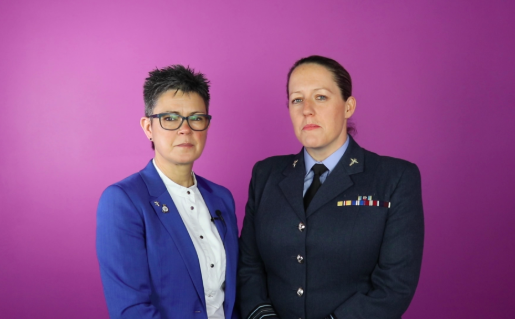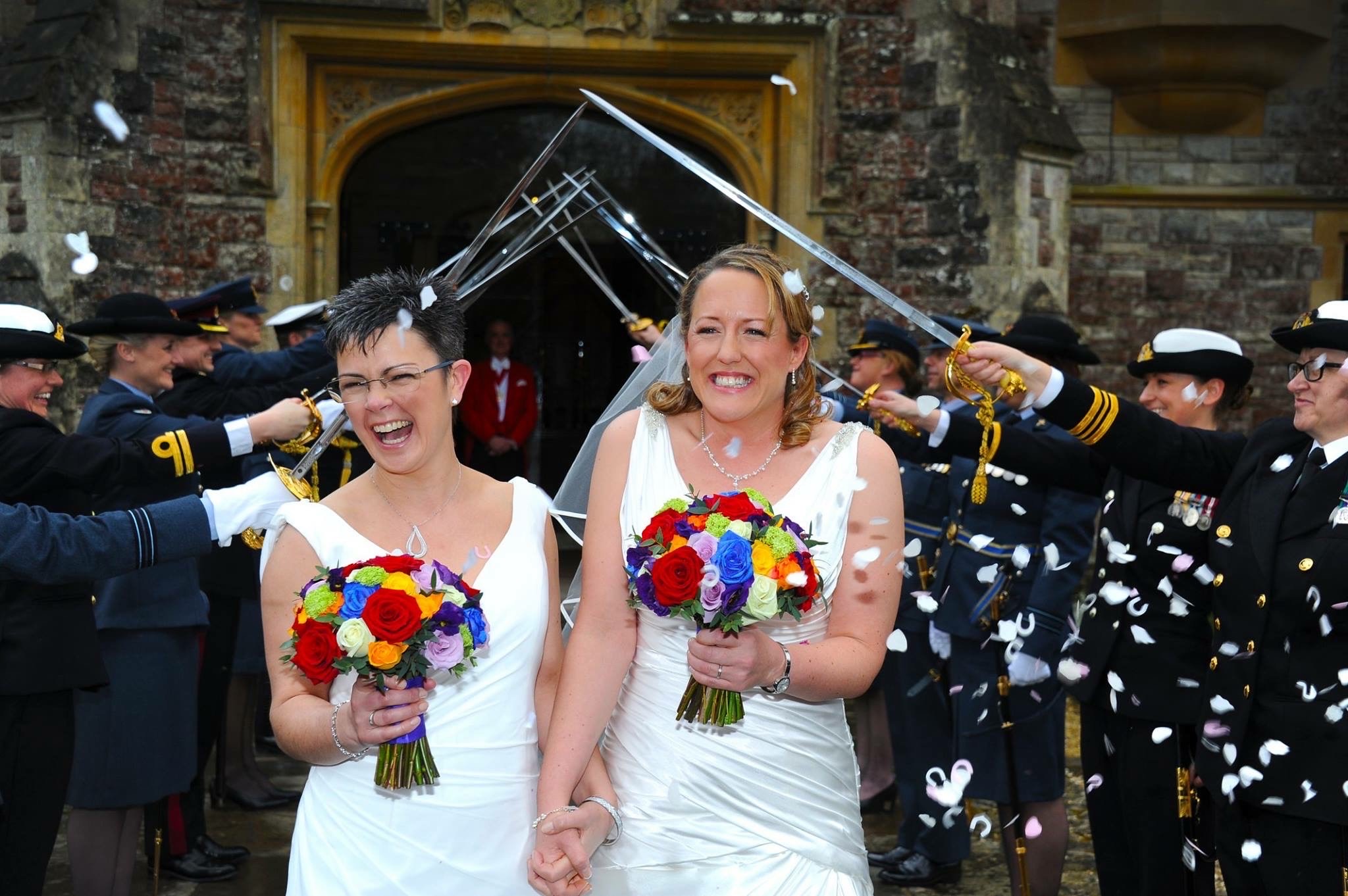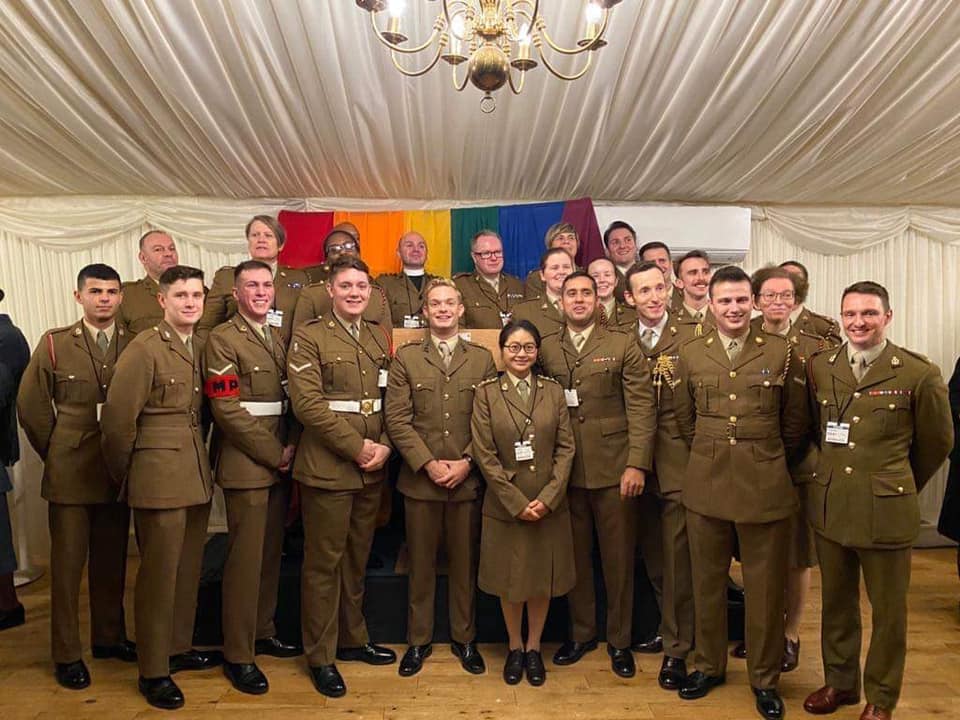‘To hide my identity was painful’: Queer members of armed forces reflect on life under military’s ‘terrifying’ gay ban

Mandy and Sherry McBain spoke to PinkNews 20 years after the end of the ban on LGB people serving in the military
The ban on LGB people in the British military was lifted 20 years ago today, but memories of the era still run deep for those who served.
It was a time when being outed could mean the loss of your job, your home, your medals, and the respect of colleagues who had become like family to you.
Homophobic language was common and unchallenged, and many LGBT+ servicemembers lived in fear that one day it would be applied to them. A single suspicious comment might tip off the Special Investigation Branch (SIB), a military unit tasked with uncovering closeted LGB people.
The SIB had the authority to raid your civilian house, go through your belongings, open sealed letters, all in search of ‘evidence’ of homosexuality.
“You’ve been named, clear your house,” was the terrifying warning, if you got a warning at all.
“It’s horrible. It’s a horrible, horrible feeling,” remembered Mandy McBain, a lesbian and ex-Navy lieutenant commander who now works for Stonewall.
She found herself under the SIB’s spotlight in 1999, just before the ban was lifted. She “lied like an Oscar winner” to clear her name, and was eventually deemed straight enough to continue serving, but the fear of being outed never went away.
“I chose not to [go to sea] because I couldn’t stand the thought of living in a ship 24/7 in a very small, confined area with people who would perhaps have suspicions about my sexuality,” she said. “It probably did have an effect on my career.”
All these people are out and proud. 20 years ago that wouldn’t have been possible pic.twitter.com/bHY8R00VmS
— PinkNews (@PinkNews) January 12, 2020
Avoiding the SIB simply became part of everyday life, said Sherry McBain, Mandy’s wife and a critical care nurse in the Royal Air Force.
“You sat in the pub with one eye on the back door and one eye on the front door to see if the SIB would come in,” she said.
“The landlady would give you a funny nod when she recognised any of the SIB, and then you’d do an exit through the back door and run as fast as you could. So that was kind of a normal night for us.”
Even entering the base in the company of another woman could be enough to set tongues wagging. Fortunately, Sherry found a way around this – smuggling herself in the boot of her girlfriend’s car.
She’s able to look back on this and laugh now, but the effects of the ban are real and long-lasting for many servicemembers.

Mandy and Sherry McBain at their wedding
Sergeant Alastair Smith-Weston of the Princess of Wales’ Royal Regiment is one of them. He now lives openly as a gay man, and feels “immense pride” at being able to serve in the military as he does so, but when he first joined the army that was far from the case.
“I couldn’t be truly who I was, I felt I couldn’t be open. I had to live that double life. I had my work life and I had my home life, and I had to keep the two completely separate,” he said.
“I was very fearful of losing my job. Not fully knowing at the time the process that would happen, all I knew was that would be the end of my career.”
He was keenly aware of individuals who had suddenly disappeared from work one day “under a cloud of whispers”, leaving behind rumours of homosexuality and an investigation.
It was clear that coming out of the closet wasn’t an option, and he went to great lengths to hide his sexuality – even marrying a woman and having children.
While he doesn’t regret the opportunity to become a father, he does regret concealing his true self from the people he was living and working with in such close quarters.
“To hide my identity from myself was quite painful,” he admitted. “I’d finally found a group of people that I believed in, that I trusted. I’d found my new family. But I always felt only half of myself to not be able to tell them.”

The Royal Air Force marching at Pride (image supplied)
In 2000 the armed forces turned a corner. The ban on LGB people in the military was finally lifted thanks to a ruling from the European Court of Human Rights, and a new era of commitment to equality and inclusion was ushered in.
The government formally apologised for the LGB ban for first time earlier this week, admitting that “it was unacceptable then and it is unacceptable now.”
Today the British armed forces has a thriving LGBT+ community and, last year, the British Army, Navy, Air Force and Marines were all ranked among Stonewall’s top employers for LGBT+ people.
“In a very short space of time, things changed very quickly. And a lot of that came from having strong, empowered leaders to make that change,” said captain Jamie Carahar, chair of the army’s LGBT+ forum.
He considered that the push for inclusivity was a natural step for the armed forces as it hinges on one of the military’s core values – respect. That respect now goes both ways, as LGBT+ servicemembers are supported by the whole chain of command.
The next step, and arguably a more challenging one for a workforce as strongly gendered as the military, will be acceptance of non-binary and gender non-conforming identities.
Although moves are now being made towards gender-neutral toilets, uniforms and policies, much of the armed forces is still divided down the lines of male and female, and it remains to be seen how it will adapt to this in future.

LGBT+ members of the armed forces celebrating the repeal of the military ban at the House of Commons on Thursday (Facebook/Alastair Smith-Weston)
From the perspective of those who served under the ban, the future certainly looks bright – even though the memory of its repeal may be bittersweet.
“We’ve got a lot to celebrate today in terms of how far [the armed forces] has come, but we really do need to remember those people during the ban and those times had such a massive impact,” Sherry said.
“Things do change,” Mandy added. “I don’t think it’ll ever go back to how it was. But I think it’s very important that we do remember how it was.”

